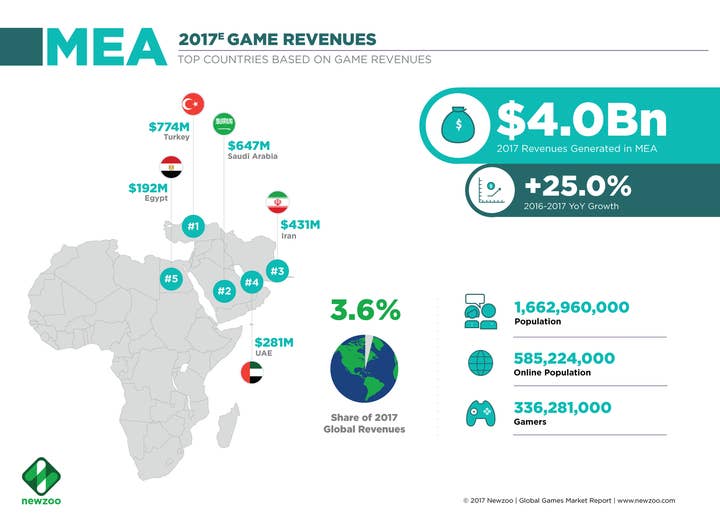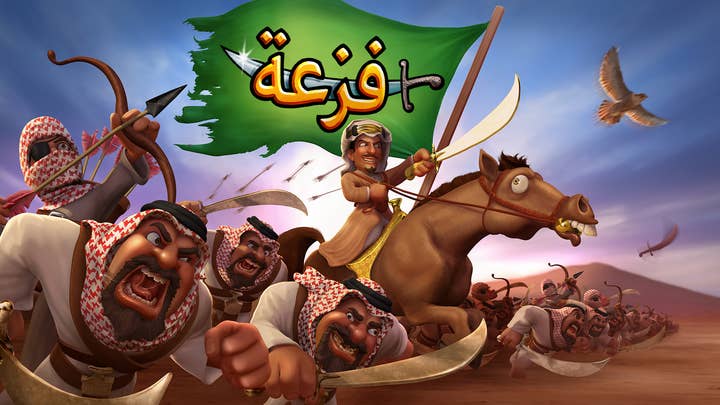Gaming in the Middle East is poised for a breakout
Lara Noujaim, director of publishing at Game Cooks, explains why the Middle East will provide the next big opportunity for games
Today, the world appears to be more divided than ever.
In times like these, with differences emphasized rather than celebrated and people frequently ostracized, there's a desperate need for a universal language that connects individuals from all around the world.
Prior to being part of the Game Cooks team, a VR game studio based in Beirut, and while living for a few years in Santa Clara (CA), it was clear how far apart the two cities were from every perspective: geographically, culturally and everything in between.
It was during the start of my tenure at Game Cooks back in 2012, and following numerous back and forth trips to the US to attend gaming conferences, that the distance between both cities started to notably shrink to the point that it became almost irrelevant.
While differences faded away, similarities and shared passions came alive, with every encounter that came my way. It felt nice, right even, and it was all thanks to gaming. It was at that moment when it really made sense how gaming was the universal language the world needs, since gamers all across the globe uttered its familiar words.
And that includes people from the MEA (Middle East and Africa) region, where gaming is considered a big part of everyday life. The MEA is home to the world's most active gaming community. That statement is often met with looks of disbelief and surprise.
"It is difficult for many to think of the Middle East as anything other than a bedrock of conflict... Gaming is a tool that can be harnessed to change the rhetoric and make labels and stereotypes irrelevant"
It is difficult for many to think of the Middle East as anything other than a bedrock of conflict. Yet, the region has a lot of potential and gaming is a tool that can be harnessed to change the rhetoric and make labels and stereotypes irrelevant.
The MEA region enjoys a hefty population of online gamers - 587 million in 2017 according to Newzoo - and these gamers' favorite pastime is starting to have an impact on the region's share of gaming profit.
Close to 60% of the online population are gamers - playing PC, console or mobile games. While that population accounts for only 3.6% of the $108.9 billion games market, it is the region with the highest growth rate globally.
The MEA is currently gaining at a whopping rate of 25% year-over-year growth rate, and the region is ahead of other fast growing markets such as Latin America at 13.9% growth and APAC (Asia Pacific) at 9.2% growth; it also contrasts with larger markets where growth is slowly stagnating - such as North America (just 4%) and Western Europe (4.8%).
Looking at these figures, the region's gaming market is definitely one to keep an eye on.

The top three countries leading said growth are Egypt, UAE, and Saudi Arabia. That comes as little surprise considering the fact that both UAE and Saudi Arabia are among the countries with the highest smartphone penetrations in the world, standing at 80.6% and 65.2%, respectively.
In addition, the Kingdom is the biggest gaming market in the region, with gaming revenue reaching $651 million. This year, the country made it on to the list of top 20 countries by game revenue.
Taking a closer look at a country like Saudi Arabia paints a clearer picture of what the gaming market looks like in the Middle East. Thanks to the country's conservative culture, its citizens have limited access to a diverse range of entertainment and as a result, turn to gaming as a pastime.
"While Arabic is one of the top five spoken languages around the world by population, the number of Arabic titles on app stores is still surprisingly low"
The Kingdom's young generation has a lot of spare time and an above average disposable income, which they choose to spend on gaming. Saudi gamers actually spend three times more than American and European gamers, on average.
Indeed, most of the gaming whales, both men and women, reside in the Gulf area where players have large purchasing power. At the same time, it's important to note that certain countries in the MEA have not enjoyed such a thriving gaming market - a weak internet infrastructure and low credit card penetration has made gaming a harder hobby to get into.
The regional app store homepage looks quite similar to other app stores' storefronts around the world; several of its top positions are occupied by well-known international titles.
What's specific to the region's app stores, however, are Arabic titles. And while Arabic is one of the top five spoken languages around the world by population, the number of Arabic titles on app stores is still surprisingly low. This is slowly changing as both developers and platform holders have come to realize the great impact that localization has had on sales numbers in the region.
Today, a handful of companies, both local and international, have understood and experienced first-hand the result of localizing their titles. In 2012, Game Cooks launched one of the first Arabic mobile game titles, Run For Peace.
As the name implies, the game was about a character, called Salim, on a peace-spreading journey through the Middle East. The game was launched around the time of the Arab Spring and within a few weeks, it had received over a quarter of a million downloads.
A large portion of the game's player base came from the Middle East - players who related to the character Salim, the humor and the abundant funny cultural references in the game such as the flying watermelon shishas and hummus collectibles.

Another, well-known example is gaming giant EA Sports.
The Middle East is one of EA's key regions for its FIFA titles, so in 2011/2012, EA introduced full Arabic menus, along with commentary from regional football legends. The move really paid off, as it was well received by the Arab FIFA fan community and resulted in a steep increase in sales, which led to other developers following suit.
This served as proof of the opportunities that exist within the MEA gaming market, which has a lot more room for growth. Regional game developers can take advantage by catering to that audience and providing them with culturally relevant content.
While the gaming market is growing in the region, the game development community has yet to catch up.
Currently, a small number of game development studios are launching games from the region and there are only a handful of success stories. The game development scene started picking up traction on this side of the world not too long ago, and so there are only clusters of very small game dev communities and even fewer opportunities to collaborate, share and learn from one another.
Furthermore, weak internet infrastructures in certain countries has made it harder to get work done, and on top of that, there is a shortage of gaming talent: a lack of opportunities means that most talent tends to leave to work for big gaming studios abroad.
"Indie development clusters are growing. Game accelerators are popping up, such as Arab Arcade in Beirut, and interest in game development as a career choice is becoming more common"
The MEA has a long way to go to become a major gaming hub like the US or Europe. A lack of gaming conferences until recently made it harder for developers to network and get exposed to new ideas and technologies. Lack of funding is also a problem; investors from the region shy away from this industry, seeing it as a risky, hit-driven business.
This, in turn, makes it hard for the game development market to grow. And finally, local developers see their markets eroded by top international titles that are favorites in the region as well.
However, things are changing and today the indie development clusters are growing. Game accelerators are popping up, such as Arab Arcade in Beirut, and interest in game development as a career choice is becoming more common - especially in markets such as Lebanon and Jordan where there are several established game studios and a growing game dev community.
Today the region has its own gaming conference, the Digital Games Conference in Dubai, which brings in experts from around the world to encourage knowledge sharing and provide attendees exposure to the local gaming scene.
One advantage regional game studios have over international publishers is cultural know-how, of course. Proximity to the MEA's players and fully understanding their gamer profiles is a big deal.
Regional developers are using that to differentiate themselves in several ways: localization, new culturally relevant content, and innovation.

Some regional game studios are lending their knowledge of the language and culture to help international publishers localize their existing games to make them more relevant to the region.
Localization can be as simple as changing the language or it can go further to include cultural references, relevant characters, sounds, etc. Other game studios are creating brand-new games that fall within the same genre and type as well-known international titles but with a design and aesthetic that appeals more to the region's players.
While some developers are tackling the market by way of localization and culturally relevant content, others are looking to stand out by innovating and showing that great content can emerge from the Middle East. And that's exactly why Game Cooks launched Vindicta - the first VR title to be published by a Middle Eastern studio.
The MEA, as most news headlines can attest to, is by far one of the most talked about regions in the world and often not in the most positive of ways. However, if you look beyond these daily news round-ups you'll discover how much this region has to offer in terms of history, culture and yes, gaming.